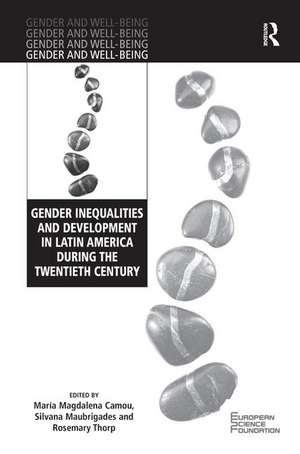Gender Inequalities and Development in Latin America During the Twentieth Century: Gender and Well-Being
Autor María Magdalena Camou, Silvana Maubrigades, Rosemary Thorpen Limba Engleză Hardback – 6 ian 2016
| Toate formatele și edițiile | Preț | Express |
|---|---|---|
| Paperback (1) | 253.67 lei 6-8 săpt. | |
| Taylor & Francis – 30 iun 2020 | 253.67 lei 6-8 săpt. | |
| Hardback (1) | 1062.13 lei 6-8 săpt. | |
| Taylor & Francis – 6 ian 2016 | 1062.13 lei 6-8 săpt. |
Preț: 1062.13 lei
Preț vechi: 1295.28 lei
-18% Nou
Puncte Express: 1593
Preț estimativ în valută:
203.24€ • 212.73$ • 169.16£
203.24€ • 212.73$ • 169.16£
Carte tipărită la comandă
Livrare economică 31 martie-14 aprilie
Preluare comenzi: 021 569.72.76
Specificații
ISBN-13: 9781472436887
ISBN-10: 1472436881
Pagini: 278
Ilustrații: Includes 44 b&w illustrations
Dimensiuni: 156 x 234 x 18 mm
Greutate: 0.67 kg
Ediția:New ed
Editura: Taylor & Francis
Colecția Routledge
Seria Gender and Well-Being
Locul publicării:Oxford, United Kingdom
ISBN-10: 1472436881
Pagini: 278
Ilustrații: Includes 44 b&w illustrations
Dimensiuni: 156 x 234 x 18 mm
Greutate: 0.67 kg
Ediția:New ed
Editura: Taylor & Francis
Colecția Routledge
Seria Gender and Well-Being
Locul publicării:Oxford, United Kingdom
Cuprins
Introduction, María Camou, Silvana Maubrigades and Rosemary Thorp; Historical patterns of gender inequality in Latin America: new evidence, María Camou; Women's age at first marriage in Latin America, Silvana Maubrigades; The gender order in Argentina in the 'oligarchic' period (1880-1930), Silvia Berger; Women´s wages and the gender gap during the period of import substituting industrialization in Chile, Nora Reyes; Male and female paid work, Chile 1930-1970: characteristics, trends and representations, Lorena Godoy; Gender trends in Colombia during the first half of the twentieth century: a demographic and an educational comparison, Loly Aylú Gaitán Guerrero and Daniel Gómez Abella; Women rising: dynamics of the education system and the labour market in Colombia, 1900-2000, María del Pilar López-Uribe and Diana Quintero Castellanos; Women’s labour force participation in Mexico during the twentieth century: childbearing and career decisions, Aurora Gómez Galvarriato and Lucía Madrigal; The evolution of the labour supply and gender differences in Uruguay 1991-2009, Alma Espino and Alina Machado; A gender inequality historical database for Latin America, Gastón Díaz
Notă biografică
MarÃa Magdalena Camou, Universidad de la República, Uruguay. Silvana Maubrigades, Universidad de la República, Uruguay. Rosemary Thorp, University of Oxford, UK.
Descriere
This book presents evidence of the evolution of the gender inequalities in Latin America during the twentieth century, using basic indicators of human development, namely education, health and the labour market. By gauging the extent to which gender gaps in the formation of human capital, access to resources, quality of life and opportunities may have operated as a restriction on women’s capabilities and on economic growth in the region, this book demonstrates that Latin America has lagged behind in terms of gender equality.






















